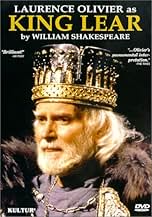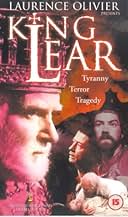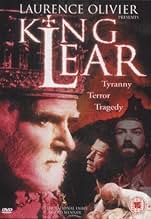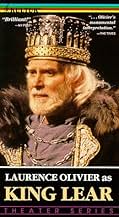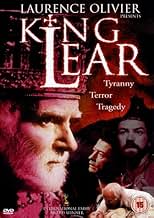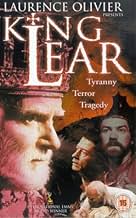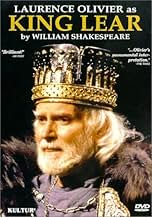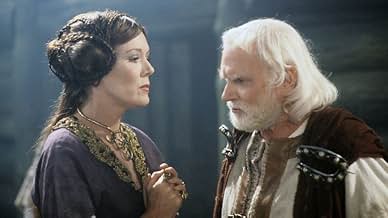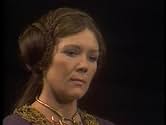AVALIAÇÃO DA IMDb
7,6/10
919
SUA AVALIAÇÃO
Adicionar um enredo no seu idiomaAging King Lear invites disaster when he abdicates to his two disloyal and obsequious daughters while rejecting the one who truly loves him.Aging King Lear invites disaster when he abdicates to his two disloyal and obsequious daughters while rejecting the one who truly loves him.Aging King Lear invites disaster when he abdicates to his two disloyal and obsequious daughters while rejecting the one who truly loves him.
- Ganhou 1 Primetime Emmy
- 2 vitórias e 3 indicações no total
Avaliações em destaque
This TV production was Laurence Olivier's final great performance, playing Lear at the age of 75 (beyond him perhaps on stage but cleverly done here).
He is supported by a large cast of stage actors - Dorothy Tutin, Anna Calder-Marshall and Diana Rigg as his daughters; Robert Lindsay and David Threlfall as the warring brothers Edmund and Edgar; Colin Blakely as Kent; Leo McKern as Gloucester; John Hurt as The Fool - all of which make their impact. The staging is memorable and pulls the viewer in to the action.
Comparable to really being there watching the greats at work in the theatre, and a fantastic piece of television drama.
He is supported by a large cast of stage actors - Dorothy Tutin, Anna Calder-Marshall and Diana Rigg as his daughters; Robert Lindsay and David Threlfall as the warring brothers Edmund and Edgar; Colin Blakely as Kent; Leo McKern as Gloucester; John Hurt as The Fool - all of which make their impact. The staging is memorable and pulls the viewer in to the action.
Comparable to really being there watching the greats at work in the theatre, and a fantastic piece of television drama.
I got lost through the first half of Olivier's Richard III. But his Lear some twenty years later sucked me in by absolute force. It may have been a bit difficult for me to ever have seen his King Lear storming across the battlefield, his sentimental age was disarming and effective. Particularly in the first scene with his dividing of the kingdom. He and Cordelia shared some intensely effective moments. His final moments are also moving and quite worthwhile. He gets a bit lost in the melodramatics of the middle, and more whines and rants "Reason not the need" than may have been necessary, but on the whole his performance shows the craft of his decades as a respected Shakespearean performer. The supporting cast is also very strong with all the daughters with the possible exception of Cordelia coming off very well. Hurt seems a bit jumbled as the fool, but that may have been the idea, and the parting shot of him tries to answer the old question of what happens to the fool after he fades out of the text. Edmund and Edgar could really be brothers, and work well in opposing roles. Both actors seem to love to show off their teeth through bushy beards, but despite moments of scenery chewing, they get the job done well. Leo McKern shines out of the supporting cast as Glouster. He is by turns jovial, tormented, lost, pained and thoughtful. An excellent interpretation of that role makes the work engaging for the stretch of time when Lear is taking his "forth act break". The sets and music may be a little crude, but the idea was that the acting be the focus, and fortunately it is. Very very nice and effective theatrical work.
I had seen King Lear on the stage with Louis Calhern when I was too young to fully appreciate it. The Olivier version was deeper with fine nuances in his performance evidencing his full insight of the meaning of this tragedy. A must for every parent. It teaches one more than all the popular books on parenting.
An all-star cast takes on Shakespeare's greatest tragedy. Laurence Olivier is Lear -- once a mighty king, now a weak, jealous old man. Tired and in need of rest, he divides his kingdom among his three daughters. Cordelia, the youngest, is good and kind, while Regan and Goneril are wicked schemers who soon turn against the king and try to murder him! Lear has loyal friends, like Kent the noble, and his jester, the Fool. Colin Blakely makes Kent into the perfect, rugged sidekick, as brave and reliable as Sam in LORD OF THE RINGS. And John Hurt makes the haunting, half-crazed fool as helpless and pitiable as Gollum, without all the creepy sliminess.
But the real stars of the play are actually the villains. Diana Rigg is delicious as Regan, the younger of the two "wicked sisters." Even when she is shiveringly evil, (joking about Gloucester's pain as she pokes out his eyes!) she remains a stunningly desirable woman. And the twisted affair between Regan and the studly but wicked Edmund is much more erotic and involving than in most productions. Robert Lindsay captures the gigolo side of Edmund perfectly, always teasing and tempting and making poor love-struck Regan literally pucker up to kiss the empty air. Diana Rigg really plays all sides of the character -- watching her pout and sulk in her tent would be sweetly endearing if she weren't so truly and completely cruel. As a result the viewer is spellbound, unable to resist the evil but horrified by the inevitable tragedy.
With an all-star cast, original scenery and a haunting musical score, this bold production is Shakespeare at the summit!
But the real stars of the play are actually the villains. Diana Rigg is delicious as Regan, the younger of the two "wicked sisters." Even when she is shiveringly evil, (joking about Gloucester's pain as she pokes out his eyes!) she remains a stunningly desirable woman. And the twisted affair between Regan and the studly but wicked Edmund is much more erotic and involving than in most productions. Robert Lindsay captures the gigolo side of Edmund perfectly, always teasing and tempting and making poor love-struck Regan literally pucker up to kiss the empty air. Diana Rigg really plays all sides of the character -- watching her pout and sulk in her tent would be sweetly endearing if she weren't so truly and completely cruel. As a result the viewer is spellbound, unable to resist the evil but horrified by the inevitable tragedy.
With an all-star cast, original scenery and a haunting musical score, this bold production is Shakespeare at the summit!
I am becoming increasingly aware that some of my favorite actors are just dumb, that they don't have a vision as grand as the work they are a part of. I don't know that this should be so surprising, given what it takes to be an actor.
Olivier both acts and directs here, and what we have is a shame because he just doesn't understand this play, the important half anyway. Half of the play is about the relationships among people, specifically about the parent-child relationship and its regal surrogate of fealty (the fool, Kent and Gloucester to the King). When Olivier is relating to one of these, he is marvelous.
But half of the play is about Lear's relationship to unseen demons, sprites, devils. He sees and relates to these as intensely and with as much duration as with the daughters. (This is mirrored by Gloucester who cannot see them.) In this part of the play, roughly the middle, the language comes alive as it takes us into the Elizabethan equivalent of science fiction. This is some of the best language in Shakespeare, which is to say the best stuff anywhere.
And what does Olivier give us? Mumbling, sometimes under the wind noise. The fulcrum of this magic is the sequence with the Fool and Poor Tom. It is the heart of the magic, which Shakespeare later amplified with the `trial.' Olivier cuts most of that, and gives us a muddle. (Literally, Tom wallowing in the mud.)
The music is horrid, as it is with his much earlier Hamlet. The swordplay is bombastic. The sets are cheesy, especially the faux Stonehenge. If he understood the importance of Stonehenge, why drop the notion of magic in the core of the play? I just don't get it: I don't understand how he couldn't get it.
At the very last page, Lear kneels over the dead Cordelia and says `my poor fool is hanged.' Then looking for life in a magical revival asks to have HER button undone, which likely undoes a garment like that we have seen on the long-lost Fool. Rich stuff that, as big a twist as `Sixth Sense.' But Olivier slurs over on his way to rambling about dogs and rats and then asks for HIS button to be undone. My my.
Advice: Lear is one of the very best of the plays. I'll grant that Olivier is a fine actor, but this is a very poor offering indeed. Ignore.
Olivier both acts and directs here, and what we have is a shame because he just doesn't understand this play, the important half anyway. Half of the play is about the relationships among people, specifically about the parent-child relationship and its regal surrogate of fealty (the fool, Kent and Gloucester to the King). When Olivier is relating to one of these, he is marvelous.
But half of the play is about Lear's relationship to unseen demons, sprites, devils. He sees and relates to these as intensely and with as much duration as with the daughters. (This is mirrored by Gloucester who cannot see them.) In this part of the play, roughly the middle, the language comes alive as it takes us into the Elizabethan equivalent of science fiction. This is some of the best language in Shakespeare, which is to say the best stuff anywhere.
And what does Olivier give us? Mumbling, sometimes under the wind noise. The fulcrum of this magic is the sequence with the Fool and Poor Tom. It is the heart of the magic, which Shakespeare later amplified with the `trial.' Olivier cuts most of that, and gives us a muddle. (Literally, Tom wallowing in the mud.)
The music is horrid, as it is with his much earlier Hamlet. The swordplay is bombastic. The sets are cheesy, especially the faux Stonehenge. If he understood the importance of Stonehenge, why drop the notion of magic in the core of the play? I just don't get it: I don't understand how he couldn't get it.
At the very last page, Lear kneels over the dead Cordelia and says `my poor fool is hanged.' Then looking for life in a magical revival asks to have HER button undone, which likely undoes a garment like that we have seen on the long-lost Fool. Rich stuff that, as big a twist as `Sixth Sense.' But Olivier slurs over on his way to rambling about dogs and rats and then asks for HIS button to be undone. My my.
Advice: Lear is one of the very best of the plays. I'll grant that Olivier is a fine actor, but this is a very poor offering indeed. Ignore.
Você sabia?
- CuriosidadesEsmond Knight (Old Man) previously appeared in all three Shakespearean films directed by Laurence Olivier: Henrique 5º (1944), Hamlet (1948) and Ricardo III (1955).
- ConexõesFeatured in The 36th Annual Primetime Emmy Awards (1984)
Principais escolhas
Faça login para avaliar e ver a lista de recomendações personalizadas
Detalhes
- Data de lançamento
- País de origem
- Central de atendimento oficial
- Idioma
- Também conhecido como
- King Lear
- Empresa de produção
- Consulte mais créditos da empresa na IMDbPro
Contribua para esta página
Sugerir uma alteração ou adicionar conteúdo ausente

